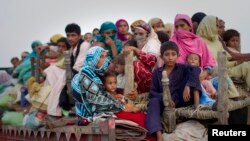Globally, one in eight people goes to bed hungry every night. That figure is double in sub-Saharan Africa, where one in four people suffers from chronic hunger.
The Earth’s population is expected to grow from 7 to more than 9 billion people by 2050; and because extreme conditions such as hotter temperatures, longer droughts and unpredictable rainfall patterns are increasing stress on food production, producing sufficient food for all will become more challenging.
We cannot prevent extreme weather, but we can better prepare for the problems it may cause. The number of weather-related disasters has tripled in the last 30 years, and while low-income countries suffered through only 9 percent of them, they represented 48 percent of all fatalities.
That is why the United States Agency for International Development, or USAID, is partnering with the Rockefeller Foundation to form the Global Resilience Partnership, a public-private initiative to build local resilience to chronic shocks and stresses.
By better aligning humanitarian and development planning, connecting the private sector with civil society and government, and crowd-sourcing innovations and solutions, the Resilience Partnership will enable communities to prepare for, withstand, and emerge from shocks and stresses in a way that reduces chronic vulnerability and keeps them on the pathway to development.
The Global Resilience Partnership will focus on the Sahel, the Horn of Africa, and South and Southeast Asia: areas particularly susceptible to chronic stresses and extreme shocks. In the Horn of Africa and the Sahel, some 23 million people suffered from hunger due to drought in 2011 and 2012. Conversely, in South and Southeast Asia, over 400 million people are expected to be affected by flooding within the next decade.
“Disasters and shocks pose an unparalleled threat to the world’s most vulnerable communities and hamstring global humanitarian response,” said USAID Administrator Rajiv Shah.
“This new bold partnership will help the global community pivot from being reactive in the wake of disaster to driving evidence-based investments that enable cities, communities and households to better manage and adapt to inevitable shocks. USAID is proud to partner with the Rockefeller Foundation in advancing this new model, harnessing public-private partnerships and empowering country leadership to end extreme poverty.”




